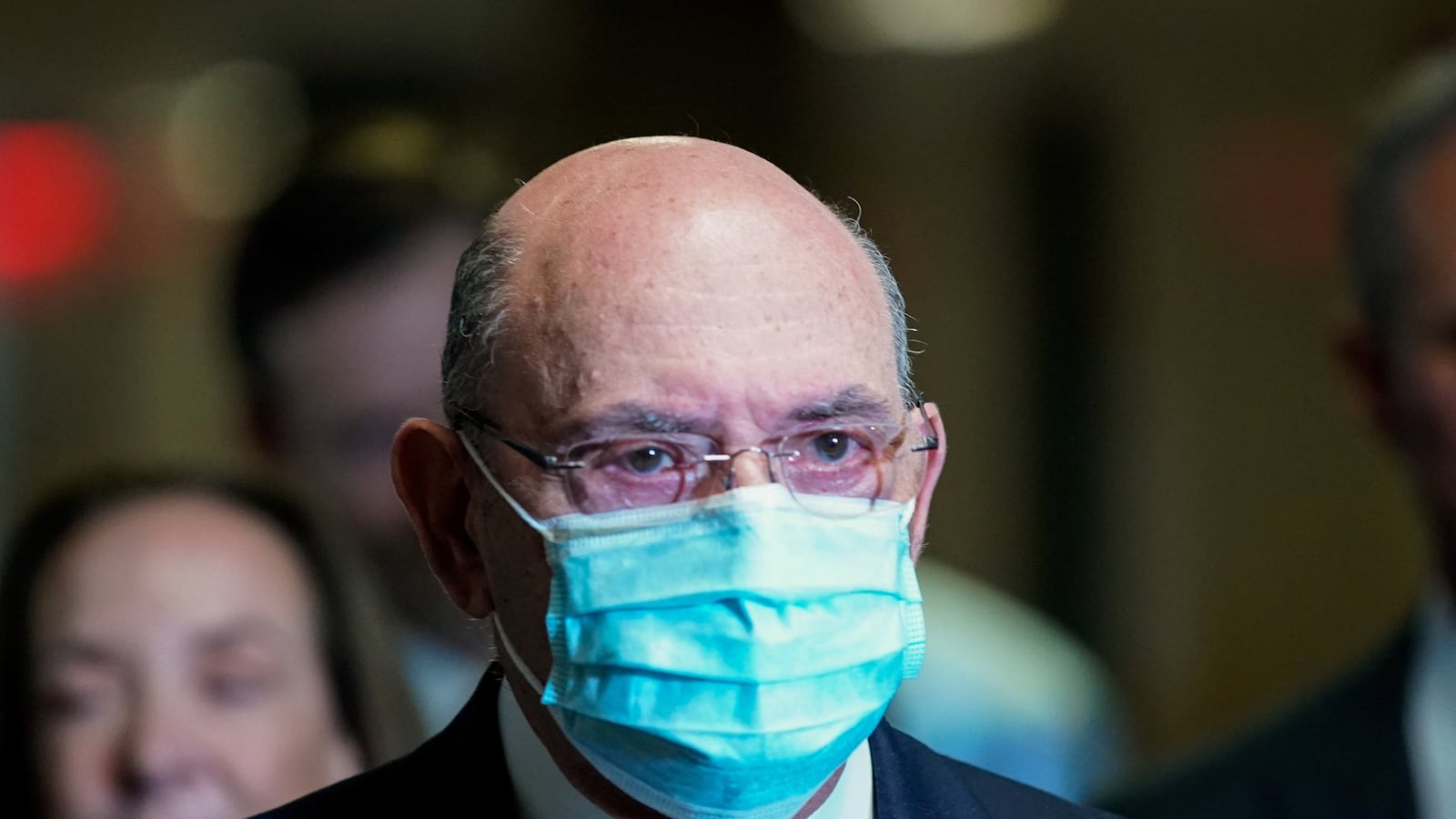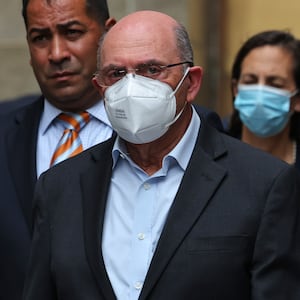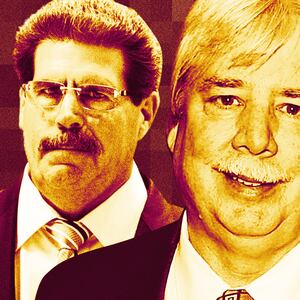The Manhattan District Attorney’s attempts to flip former President Donald Trump’s loyal money man have officially failed, as the tax-dodging ex-chief financial officer Allen Weisselberg took a plea deal Thursday morning and won’t testify against his lifelong boss.
Instead, he’ll get what some might consider a sweetheart deal for a 75-year-old man who kept his lips shut and wouldn’t implicate his old boss: six months or less behind bars. His legal team expects him to realistically spend three months in prison, and he will face five years of probation after serving his sentence.
He will also have to pay back $1,994,321 in taxes he owed, prosecutors said in court.
In return, Weisselberg has also agreed to openly testify about the way the Trump Organization rewarded him with untaxed corporate perks for years in the form of expensive tuition payments for his grandkids at a top-tier Manhattan private school, a luxury car to use anytime he wished, and a fully-paid swanky apartment overlooking Central Park. His testimony could prove pivotal to convicting the corporation, which would be forced to pay fines and would reflect negatively on the Trump family company—not that it would make a difference politically to MAGA devotees.
In a courtroom packed with journalists on Thursday, Weisselberg admitted to the criminal charges laid out in the indictment: grand larceny, criminal tax fraud, falsifying business records, offering a false instrument for filing, conspiracy, and scheme to defraud.
The second degree grand larceny charge, a felony in the state of New York, carries the stiffest possible penalty: up to 15 years in prison.
In court, Weisselberg admitted to the long list of financial crimes described aloud by New York Justice Juan Merchan: dodging payroll taxes, getting “multiple Mercedes Benz vehicles,” and concealing the fact that he was a New York City resident who owed municipal taxes.
Although both sides will claim victory on Thursday, the development is a setback for the Manhattan District Attorney. An investigation that began nearly more than four years ago under the previous DA, Cyrus Vance Jr., set Trump himself as the ultimate target.
It all started when journalists uncovered how Trump, in the waning days of his 2016 presidential campaign, used his company to keep his political aspirations from dying by quietly paying off porn star Stormy Daniels to keep her silent about their brief sexual affair in which Trump cheated on his wife Melania. Federal prosecutors with the Southern District of New York went after Michael Cohen, then Trump’s personal lawyer, for brokering the deal and moving the money around—landing him in prison. Meanwhile, Weisselberg, who played a key role in authorizing the payments, got away scot-free.
When federal prosecutors wouldn’t go after Trump, Vance kicked into action. His prosecutors quietly traveled upstate to the medium security federal correctional institution at Otisville, New York, where they met with Cohen and established him as the primary witness for a probe into the Trump Organization’s mob-like tactics and possible violations of campaign finance laws.
Vance aggressively fought to obtain Trump’s personal tax returns, a legal endeavor that required two trips to the U.S. Supreme Court, where he eventually won. All the while, Trump remained the focus of the criminal investigation.
Then came a decisive turning point in November 2020, when Bloomberg journalist Caleb Melby revealed how the Trump Organization had handsomely rewarded CFO Allen Weisselberg with untaxed perks. According to court documents filed much later by the DA’s office, that news article pointed them to another key witness: the accountant’s former daughter-in-law, Jennifer Weisselberg.
She had divorced his son, Barry, who in typical nepotistic Trump Org fashion had run the company’s Central Park ice rink operation. She was willing to hand over documents detailing how her former father-in-law had been compensated for staying loyal to Trump—and as she put it, always covering up for his dirty deeds.
Vance tapped a top attorney in his office, Carey Dunne, to lead the team. He also hired a retired prosecutor known for mob takedowns, Mark Pomerantz, to guide the investigation. According to three sources with direct knowledge of the probe, investigators remained laser focused on the role Trump played as the company’s head honcho and they repeatedly asked about how to turn longtime and high-ranking employees—like chief operations officer Matt Calamari Sr. or his son, corporate security director Matt Calamari Jr.—against their boss. Prosecutors tried to use a long-running fight between two dynasties—the Weisselbergs and the Calamaris—against one another, according to sources.
Weisselberg and the Trump Organization were indicted by a New York grand jury on June 30, 2021. The move was widely seen as a first step toward getting at Trump, following the typical mob takedown playbook of working from the bottom up. But as the months went by, the prospects of that began to fade.
Prosecutors had Weisselberg’s right-hand man, the company controller Jeffrey S. McConney, testify before a grand jury. But in doing so, they also gave the mid-level accountant a Get Out of Jail Free card. New York has a unique rule that grants complete criminal immunity to anyone who testifies before a grand jury—for anything they admit having done.
According to three sources and a description of the situation in court records, McConney used the opportunity to make himself a fall guy, taking the blame for Weisselberg’s tax-dodging compensation scheme. McConney, who was an unindicted co-conspirator in the Weisselberg indictment, got away clean.
Vance decided to not run for re-election and was replaced by Alvin Bragg Jr., who promptly upon taking office in January became a source of frustration for Dunne and Pomerantz, according to sources. Both quit in frustration in February, protesting the new DA’s unwillingness to indict Trump with the mountain of evidence the prosecution team had already gathered documenting alleged business fraud.
Cohen, who will no longer have the opportunity to testify against his former co-worker, told The Daily Beast he was sorely disappointed.
“I believe it is counterproductive to permit an individual who committed years and years of tax fraud, failed to cooperate or provide any testimony to authorities, and burdened the system with a ‘not guilty’ plea followed by motions for dismissal to receive the benefit of a five-month plea deal. Just another example of disproportionate sentencing,” Cohen said.









